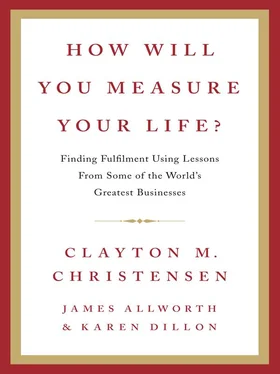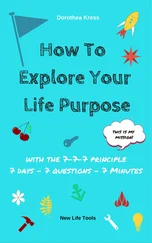How Will You Measure Your Life?
Clayton M. Christensen
James Allworth & Karen Dillon

HarperCollinsPublishers
1 London Bridge Street
London SE1 9GF
www.harpercollins.co.uk
First published by HarperBusiness, an imprint of HarperCollinsPublishers 2012
This edition 2012
1 3 5 7 9 10 8 6 4 2
Clayton M. Christensen, James Allworth, and Karen Dillon assert the moral right to be identified as the authors of this work
A catalogue record of this book is available from the British Library
HOW WILL YOU MEASURE YOUR LIFE?. © Clayton M. Christensen, James Allworth, and Karen Dillon 2012. All rights reserved under International and Pan-American Copyright Conventions. By payment of the required fees, you have been granted the non-exclusive, non-transferable right to access and read the text of this ebook on-screen. No part of this text may be reproduced, transmitted, down-loaded, decompiled, reverse engineered, or stored in or introduced into any information storage and retrieval system, in any form or by any means, whether electronic or mechanical, now known or hereinafter invented, without the express written permission of HarperCollins ebooks.
Ebook Edition © APRIL 2012 ISBN: 9780007449163
Version 2018-03-09
To our families


Title Page
Copyright
Dedication
Prologue
1 Just Because You Have Feathers …
Section I
Finding Happiness in Your Career
2 What Makes Us Tick
3 The Balance of Calculation and Serendipity
4 Your Strategy Is Not What You Say It Is
Section II
Finding Happiness in Your Relationships
5 The Ticking Clock
6 What Job Did You Hire That Milkshake For?
7 Sailing Your Kids on Theseus’s Ship
8 The Schools of Experience
9 The Invisible Hand Inside Your Family
Section III
Staying Out of Jail
10 Just This Once …
Epilogue
Acknowledgments
About the Authors
Also by Clayton M. Christensen
Credits
About the Publisher

ON THE LAST day of the course that I teach at Harvard Business School, I typically start by telling my students what I observed among my own business school classmates after we graduated. Just like every other school, our reunions every five years provided a series of fascinating snapshots. The school is superb at luring back its alumni for these events, which are key fund-raisers; the red carpet gets rolled out with an array of high-profile speakers and events. My own fifth-year reunion was no exception and we had a big turnout. Looking around, everyone seemed so polished and prosperous—we couldn’t help but feel that we really were part of something special.
We clearly had much to celebrate. My classmates seemed to be doing extremely well; they had great jobs, some were working in exotic locations, and most had managed to marry spouses much better-looking than they were. Their lives seemed destined to be fantastic on every level.
But by our tenth reunion, things that we had never expected became increasingly common. A number of my classmates whom I had been looking forward to seeing didn’t come back, and I had no idea why. Gradually, by calling them or asking other friends, I put the pieces together. Among my classmates were executives at renowned consulting and finance firms like McKinsey & Co. and Goldman Sachs; others were on their way to top spots in Fortune 500 companies; some were already successful entrepreneurs, and a few were earning enormous, life-changing amounts of money.
Despite such professional accomplishments, however, many of them were clearly unhappy.
Behind the facade of professional success, there were many who did not enjoy what they were doing for a living. There were, also, numerous stories of divorces or unhappy marriages. I remember one classmate who hadn’t talked to his children in years, who was now living on the opposite coast from them. Another was on her third marriage since we’d graduated.
My classmates were not only some of the brightest people I’ve known, but some of the most decent people, too. At graduation they had plans and visions for what they would accomplish, not just in their careers, but in their personal lives as well. Yet something had gone wrong for some of them along the way: their personal relationships had begun to deteriorate, even as their professional prospects blossomed. I sensed that they felt embarrassed to explain to their friends the contrast in the trajectories of their personal and professional lives.
At the time, I assumed it was a blip; a kind of midlife crisis. But at our twenty-five-and thirty-year reunions, the problems were worse. One of our classmates—Jeffrey Skilling—had landed in jail for his role in the Enron scandal.
The Jeffrey Skilling I knew of from our years at HBS was a good man. He was smart, he worked hard, he loved his family. He had been one of the youngest partners in McKinsey & Co.’s history and later went on to earn more than $100 million in a single year as Enron’s CEO. But simultaneously, his private life was not as successful: his first marriage ended in divorce. I certainly didn’t recognize the finance shark depicted in the media as he became increasingly prominent. And yet when his entire career unraveled with his conviction on multiple federal felony charges relating to Enron’s financial collapse, it not only shocked me that he had gone wrong, but how spectacularly he had done so. Something had clearly sent him off in the wrong direction.
Personal dissatisfaction, family failures, professional struggles, even criminal behavior—these problems weren’t limited to my classmates at HBS. I saw the same thing happen to my classmates in the years after we completed our studies as Rhodes Scholars at Oxford University. To be given that opportunity, my classmates had to have demonstrated extraordinary academic excellence; superior performance in extracurricular activities such as sports, politics, or writing; and significant contributions to their communities. These were well-rounded, accomplished people who clearly had much to offer the world.
But as the years went by, some of my thirty-two Rhodes classmates also experienced similar disappointments. One played a prominent role in a major insider trading scandal, as recounted in the book Den of Thieves. Another ended up in jail because of a sexual relationship with a teenager who had worked on his political campaign. He was married with three children at the time. One who I thought was destined for greatness in his professional and family spheres has struggled in both—including more than one divorce.
I know for sure that none of these people graduated with a deliberate strategy to get divorced or lose touch with their children—much less to end up in jail. Yet this is the exact strategy that too many ended up implementing.
I don’t want to mislead you. Alongside these disappointments, there are many of my classmates who have led exemplary personal lives; they have truly been an inspiration to me. But our lives are not over, and the lives of our children are just now unfolding. Understanding what causes the problems that trapped some of my classmates is important not just for those who have come off the path that they had planned to follow but for those whose lives are still on the right path—as well as those whose journeys are just beginning. We all are vulnerable to the forces and decisions that have derailed too many.
Читать дальше
















